#artificial intelligence algorithms
Explore tagged Tumblr posts
Text
What's New in AutoCAD 2026?

What's New in AutoCAD 2026?
Explore the newest features in AutoCAD 2026 — Smart Blocks, powerful automation, and intelligent AI-driven insights that are transforming the way you design.
Smart Blocks, with their advanced capabilities, simplify the creation, management, and use of blocks. By using artificial intelligence algorithms to analyze drawing context and recognize patterns, Smart Blocks offer a suite of intelligent features. These include automatic block placement, smart block replacement suggestions, object detection, and seamless block conversion.
👉 Dive into what’s new: https://blog.prototechsolutions.com/whats-new-in-autocad-2026-smart-blocks-revolutionize-repetitive-tasks/
0 notes
Text
Oh good! /s
169 notes
·
View notes
Text

Remember, girls have been programming and writing algorithms way before it was cool!
👩🏻💻💜👩🏾💻
#history#ada lovelace#computers#programing#artificial intelligence#womens history#victorian age#women empowerment#the analytical engine#girls who code#1800s#historical figures#computer history#ai#girl power#technology#empowered women#historical women#algorithm#english history#coding#like a girl#role model#programming#nickys facts
67 notes
·
View notes
Link
Check out this awesome '90 % Human, 10% Algorithm' design on @TeePublic!
#teepublic#ai#ai generated#artificial intelligence#design#digital art#art#algorithm#technology#potrait#aesthetic#digital illustration#digital innovation#typography#futuristic
27 notes
·
View notes
Text

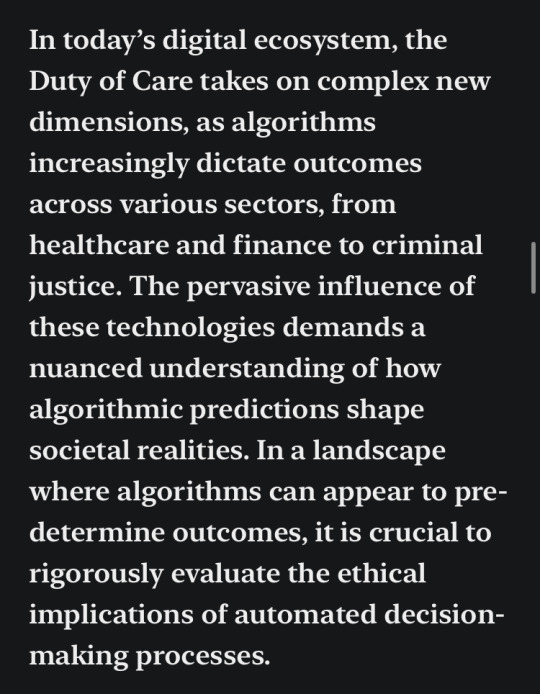
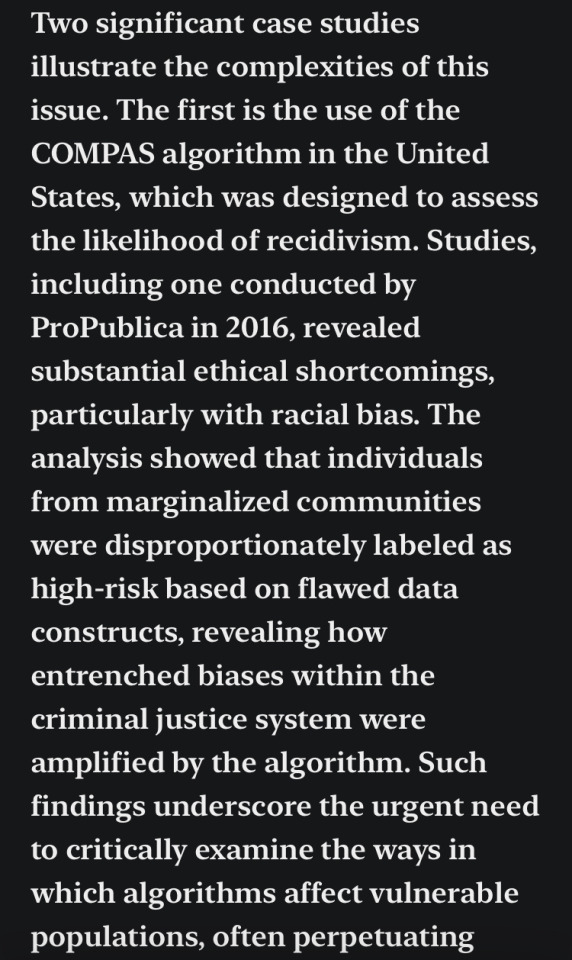
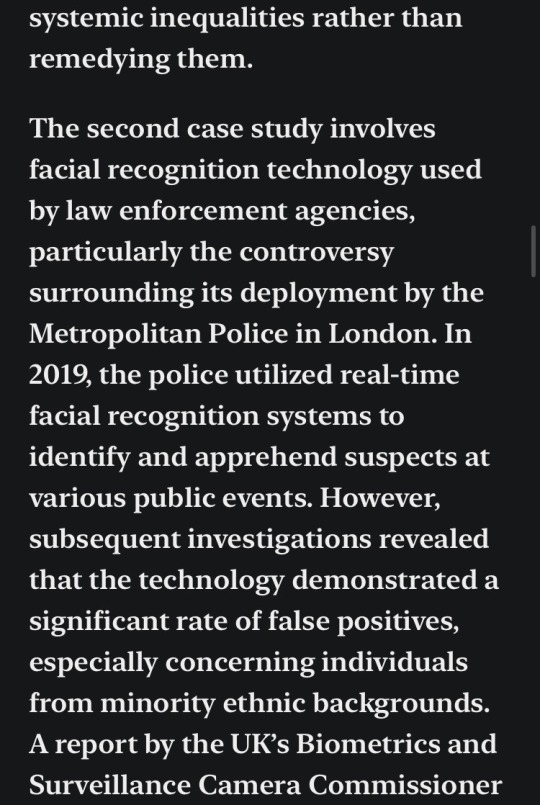
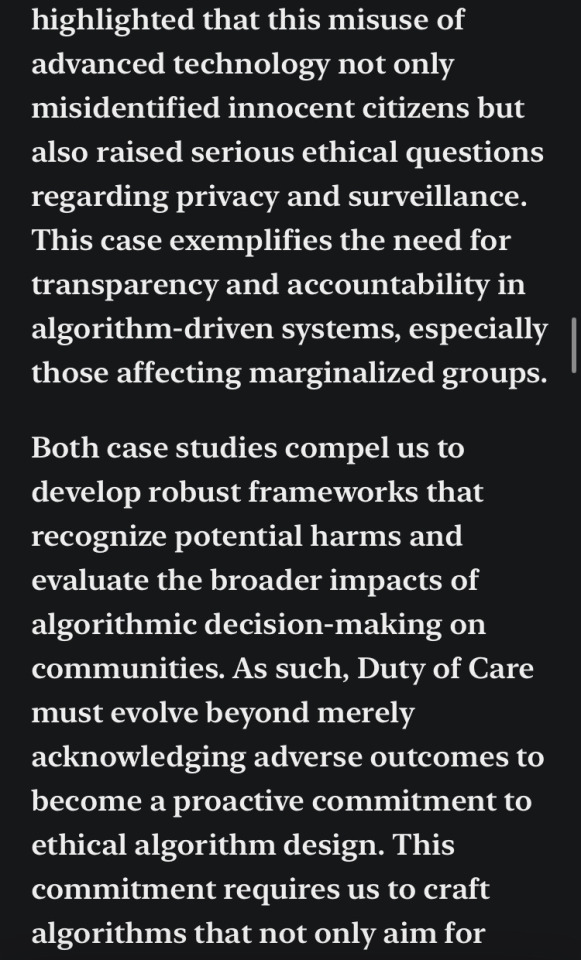

Read More Here: Substack
#algorithmic determinism#techcore#philosophy#quote#quotes#ethics#technology#sociology#writers on tumblr#artificial intelligence#duty of care#discrimination#implicit bias#law enforcement#psychologically#computational design#programming#impact
14 notes
·
View notes
Text
PSA:
An algorithm is simply a list of instructions used to perform a computation. They've existed for use by mathematicians long prior to the invention of computers. Nearly everything a computer does is algorithmic in some way. It is not inherently a machine-learning concept (though machine learning systems do use algorithms), and websites do not have special algorithms designed just for you. Sentences like "Youtube is making bad recommendations, I guess I messed up my algorithm" simply make no sense. No one at Youtube HQ has written a bespoke algorithm just for you.
Furthermore, people often try to distinguish between more predictable and less predictable software systems (eg tag-based searching vs data-driven search/fuzzy-finding) by referring to the less predictable version as "algorithmic". Deterministic algorithms are still algorithms. Better terms for most of these situations include:
data-driven
fuzzy
probabilistic
machine-learning/ML
Thank you.
#196#r196#r/196#algorithm#algorithmic#search#search engine#recommendation system#machine learning#ai#artificial intelligence
6 notes
·
View notes
Text

Neturbiz Enterprises - AI Innov7ions
Our mission is to provide details about AI-powered platforms across different technologies, each of which offer unique set of features. The AI industry encompasses a broad range of technologies designed to simulate human intelligence. These include machine learning, natural language processing, robotics, computer vision, and more. Companies and research institutions are continuously advancing AI capabilities, from creating sophisticated algorithms to developing powerful hardware. The AI industry, characterized by the development and deployment of artificial intelligence technologies, has a profound impact on our daily lives, reshaping various aspects of how we live, work, and interact.
#ai technology#Technology Revolution#Machine Learning#Content Generation#Complex Algorithms#Neural Networks#Human Creativity#Original Content#Healthcare#Finance#Entertainment#Medical Image Analysis#Drug Discovery#Ethical Concerns#Data Privacy#Artificial Intelligence#GANs#AudioGeneration#Creativity#Problem Solving#ai#autonomous#deepbrain#fliki#krater#podcast#stealthgpt#riverside#restream#murf
17 notes
·
View notes
Text

Say No to AI - and Revoke the Nobel Prize for these fancy text summary algorithms
#Say No to AI - and Revoke the Nobel Prize for these fancy text summary algorithms#artificial intelligence#anti ai#fuck ai#nobel prize#class war#global warming#extinct animals#ausgov#politas#auspol#tasgov#taspol#australia#fuck neoliberals#neoliberal capitalism#anthony albanese#albanese government
9 notes
·
View notes
Note
Hello lm hamdi ,I humbly ask for your support by reblogging this post on your account to help me and my family. As newcomers to Tumblr and GoFundMe, we are in desperate need of your kindness and support. 🙏🇵🇸🍉😔Please donate 🙏🏼Let's reach the goal as soon as possible .
Please donate 💗
#obey me nightbringer#obey me mammon#obey me raphael#obey me mephistopheles#obey me mc#free palestine#elon musk#gaza under attack#obey me lucifer#qatar#algeria#algebralien#algorithm#algérie#apt rosé#amy rose#rose#deepseek ai#deepseek artificial intelligence co ltd#deepseek vs chatgpt#deepseek r1#jobs#jobsearch#studying#attack on titan#attention slvt#ask me anything#anon ask#ask blog#send asks
7 notes
·
View notes
Text
People have shown up for my Digital Circus posts, but will they show up for my Digital Circus video??
youtube
In which I talk about Gummigoo, Ragatha, Pomni’s existential dread, and the dangerous potential of AI. Give it a watch and leave your thoughts.
Do it or I’ll-

#animation#tadc#the amazing digital circus#Pomni#Ragatha#gummygoo#gummigoo#caine#jax#zooble#kinger#gangle#princess loolilalu#ai#artificial intelligence#ragapom#buttonblossom#not a ship video but fuck it we ball#and by ball I mean attempt fruitlessly to game the algorithm#Youtube
24 notes
·
View notes
Text
Prometheus Gave the Gift of Fire to Mankind. We Can't Give it Back, nor Should We.
AI. Artificial intelligence. Large Language Models. Learning Algorithms. Deep Learning. Generative Algorithms. Neural Networks. This technology has many names, and has been a polarizing topic in numerous communities online. By my observation, a lot of the discussion is either solely focused on A) how to profit off it or B) how to get rid of it and/or protect yourself from it. But to me, I feel both of these perspectives apply a very narrow usage lens on something that's more than a get rich quick scheme or an evil plague to wipe from the earth.
This is going to be long, because as someone whose degree is in psych and computer science, has been a teacher, has been a writing tutor for my younger brother, and whose fiance works in freelance data model training... I have a lot to say about this.
I'm going to address the profit angle first, because I feel most people in my orbit (and in related orbits) on Tumblr are going to agree with this: flat out, the way AI is being utilized by large corporations and tech startups -- scraping mass amounts of visual and written works without consent and compensation, replacing human professionals in roles from concept art to story boarding to screenwriting to customer service and more -- is unethical and damaging to the wellbeing of people, would-be hires and consumers alike. It's wasting energy having dedicated servers running nonstop generating content that serves no greater purpose, and is even pressing on already overworked educators because plagiarism just got a very new, harder to identify younger brother that's also infinitely more easy to access.
In fact, ChatGPT is such an issue in the education world that plagiarism-detector subscription services that take advantage of how overworked teachers are have begun paddling supposed AI-detectors to schools and universities. Detectors that plainly DO NOT and CANNOT work, because the difference between "A Writer Who Writes Surprisingly Well For Their Age" is indistinguishable from "A Language Replicating Algorithm That Followed A Prompt Correctly", just as "A Writer Who Doesn't Know What They're Talking About Or Even How To Write Properly" is indistinguishable from "A Language Replicating Algorithm That Returned Bad Results". What's hilarious is that the way these "detectors" work is also run by AI.
(to be clear, I say plagiarism detectors like TurnItIn.com and such are predatory because A) they cost money to access advanced features that B) often don't work properly or as intended with several false flags, and C) these companies often are super shady behind the scenes; TurnItIn for instance has been involved in numerous lawsuits over intellectual property violations, as their services scrape (or hopefully scraped now) the papers submitted to the site without user consent (or under coerced consent if being forced to use it by an educator), which it uses in can use in its own databases as it pleases, such as for training the AI detecting AI that rarely actually detects AI.)
The prevalence of visual and lingustic generative algorithms is having multiple, overlapping, and complex consequences on many facets of society, from art to music to writing to film and video game production, and even in the classroom before all that, so it's no wonder that many disgruntled artists and industry professionals are online wishing for it all to go away and never come back. The problem is... It can't. I understand that there's likely a large swath of people saying that who understand this, but for those who don't: AI, or as it should more properly be called, generative algorithms, didn't just show up now (they're not even that new), and they certainly weren't developed or invented by any of the tech bros peddling it to megacorps and the general public.
Long before ChatGPT and DALL-E came online, generative algorithms were being used by programmers to simulate natural processes in weather models, shed light on the mechanics of walking for roboticists and paleontologists alike, identified patterns in our DNA related to disease, aided in complex 2D and 3D animation visuals, and so on. Generative algorithms have been a part of the professional world for many years now, and up until recently have been a general force for good, or at the very least a force for the mundane. It's only recently that the technology involved in creating generative algorithms became so advanced AND so readily available, that university grad students were able to make the publicly available projects that began this descent into madness.
Does anyone else remember that? That years ago, somewhere in the late 2010s to the beginning of the 2020s, these novelty sites that allowed you to generate vague images from prompts, or generate short stylistic writings from a short prompt, were popping up with University URLs? Oftentimes the queues on these programs were hours long, sometimes eventually days or weeks or months long, because of how unexpectedly popular this concept was to the general public. Suddenly overnight, all over social media, everyone and their grandma, and not just high level programming and arts students, knew this was possible, and of course, everyone wanted in. Automated art and writing, isn't that neat? And of course, investors saw dollar signs. Simply scale up the process, scrape the entire web for data to train the model without advertising that you're using ALL material, even copyrighted and personal materials, and sell the resulting algorithm for big money. As usual, startup investors ruin every new technology the moment they can access it.
To most people, it seemed like this magic tech popped up overnight, and before it became known that the art assets on later models were stolen, even I had fun with them. I knew how learning algorithms worked, if you're going to have a computer make images and text, it has to be shown what that is and then try and fail to make its own until it's ready. I just, rather naively as I was still in my early 20s, assumed that everything was above board and the assets were either public domain or fairly licensed. But when the news did came out, and when corporations started unethically implementing "AI" in everything from chatbots to search algorithms to asking their tech staff to add AI to sliced bread, those who were impacted and didn't know and/or didn't care where generative algorithms came from wanted them GONE. And like, I can't blame them. But I also quietly acknowledged to myself that getting rid of a whole technology is just neither possible nor advisable. The cat's already out of the bag, the genie has left its bottle, the Pandorica is OPEN. If we tried to blanket ban what people call AI, numerous industries involved in making lives better would be impacted. Because unfortunately the same tool that can edit selfies into revenge porn has also been used to identify cancer cells in patients and aided in decoding dead languages, among other things.
When, in Greek myth, Prometheus gave us the gift of fire, he gave us both a gift and a curse. Fire is so crucial to human society, it cooks our food, it lights our cities, it disposes of waste, and it protects us from unseen threats. But fire also destroys, and the same flame that can light your home can burn it down. Surely, there were people in this mythic past who hated fire and all it stood for, because without fire no forest would ever burn to the ground, and surely they would have called for fire to be given back, to be done away with entirely. Except, there was no going back. The nature of life is that no new element can ever be undone, it cannot be given back.
So what's the way forward, then? Like, surely if I can write a multi-paragraph think piece on Tumblr.com that next to nobody is going to read because it's long as sin, about an unpopular topic, and I rarely post original content anyway, then surely I have an idea of how this cyberpunk dystopia can be a little less.. Dys. Well I do, actually, but it's a long shot. Thankfully, unlike business majors, I actually had to take a cyber ethics course in university, and I actually paid attention. I also passed preschool where I learned taking stuff you weren't given permission to have is stealing, which is bad. So the obvious solution is to make some fucking laws to limit the input on data model training on models used for public products and services. It's that simple. You either use public domain and licensed data only or you get fined into hell and back and liable to lawsuits from any entity you wronged, be they citizen or very wealthy mouse conglomerate (suing AI bros is the only time Mickey isn't the bigger enemy). And I'm going to be honest, tech companies are NOT going to like this, because not only will it make doing business more expensive (boo fucking hoo), they'd very likely need to throw out their current trained datasets because of the illegal components mixed in there. To my memory, you can't simply prune specific content from a completed algorithm, you actually have to redo rhe training from the ground up because the bad data would be mixed in there like gum in hair. And you know what, those companies deserve that. They deserve to suffer a punishment, and maybe fold if they're young enough, for what they've done to creators everywhere. Actually, laws moving forward isn't enough, this needs to be retroactive. These companies need to be sued into the ground, honestly.
So yeah, that's the mess of it. We can't unlearn and unpublicize any technology, even if it's currently being used as a tool of exploitation. What we can do though is demand ethical use laws and organize around the cause of the exclusive rights of individuals to the content they create. The screenwriter's guild, actor's guild, and so on already have been fighting against this misuse, but given upcoming administration changes to the US, things are going to get a lot worse before thet get a little better. Even still, don't give up, have clear and educated goals, and focus on what you can do to affect change, even if right now that's just individual self-care through mental and physical health crises like me.
#ai#artificial intelligence#generative algorithms#llm#large language model#chatgpt#ai art#ai writing#kanguin original
9 notes
·
View notes
Text
I Sacrificed My Writing To A.I So You Don't Have To
I was thinking about how people often say "Oh, Chat GPT can't write stories, but it can help you edit things!" I am staunchly anti-A.I, and I've never agreed with this position. But I wouldn't have much integrity to stand on if I didn't see for myself how this "editing" worked. So, I sacrificed part of a monologue from one of my fanfictions to Chat GPT to see what it had to say. Here is the initial query I made:
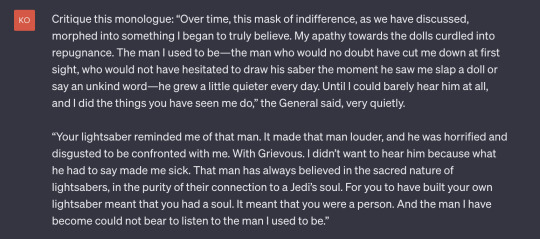
Chat GPT then gave me a list of revisions to make, most of which would be solved if it was a human and had read the preceding 150k words of story. I won't bore you with the list it made. I don't have to, as it incorporated those revisions into the monologue and gave me an edited sample back. Here is what it said I should turn the monologue into:
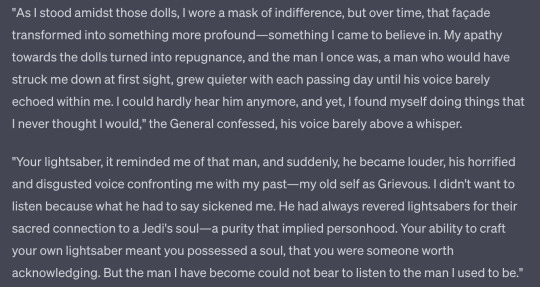
The revision erases speech patterns. Ben/the General speaks in stilted, short sentences in the original monologue because he is distinctly uncomfortable—only moving into longer, more complex structures when he is either caught up in an idea or struggling to elaborate on an idea. The Chat GPT version wants me to write dialogue like regular narrative prose, something that you'd use to describe a room. It also nullified the concept of theme. "A purity that implied personhood" simply says the quiet(ish) part out loud, literally in dialogue. It erases subtlety and erases how people actually talk in favor of more obvious prose. Then I got a terrible idea. What if I kept running the monologue through the algorithm? Feeding it its own revised versions over and over, like a demented Google Translate until it just became gibberish? So that's what I did. Surprisingly enough, from original writing sample to the end, it only took six turnarounds until it pretty much stopped altering the monologue. This was the final result:
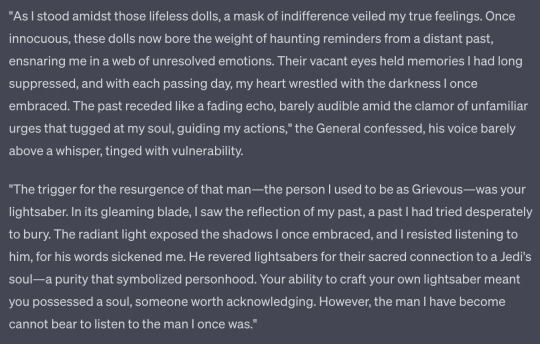
This piece of writing is florid, overly descriptive, unnatural, and unsubtle. It makes the speaking character literally give voice to the themes through his dialogue, erasing all chances at subtext and subtlety. It uses unnecessary descriptors ("Once innocuous," "gleaming," "receded like a fading echo," "someone worth acknowledging,") and can't comprehend implication—because it is an algorithm, not a human that processes thoughts. The resulting writing is bland, stupid, lacks depth, and seemingly uses large words for large word's sake, not because it actually triggers an emotion in the reader or furthers the reader's understanding of the protagonist's mindset.
There you have it. Chat GPT, on top of being an algorithm run by callous, cruel people that steals artist's work and trains on it without compensation or permission, is also a terrible editor. Don't use it to edit, because it will quite literally make your writing worse. It erases authorial intention and replaces it with machine-generated generic slop. It is ridiculous that given the writer's strike right now, studios truly believe they can use A.I to produce a story of marginal quality that someone may pay to see. The belief that A.I can generate art is an insult to the writing profession and artists as a whole—I speak as a visual artist as well. I wouldn't trust Chat GPT to critique a cover letter, much less a novel or poem.
#fanfiction#writing#chatgpt#ai#aiwriting#artificial intelligence#fanfic#fanfic meta#artificially generated#writers on tumblr#writer problems#cryptobros#if these people ever took one humanities class they'd see the issues with these algorithms#anti chat gpt#anti capitalism#anti ai#don't use chat gpt to edit your work for the love of god#ai can't write#ao3#star wars fanfiction meta#wga strike#support the writers!#wga solidarity
117 notes
·
View notes
Text
The only time this accursed site's algorithm works in my favor is when it crushes me under an avalanche of rat posts.
#personal nonsense#other times it's like “oh you liked one (1) of your mutuals' destiny posts because it had sick art in it?”#algorithms are actually so dumb (and I mean that in a Not Artificially Intelligent sense) that it baffles me#anyways this is one time this works for me rather than against me because RATTIES 💜💜💜
16 notes
·
View notes
Text
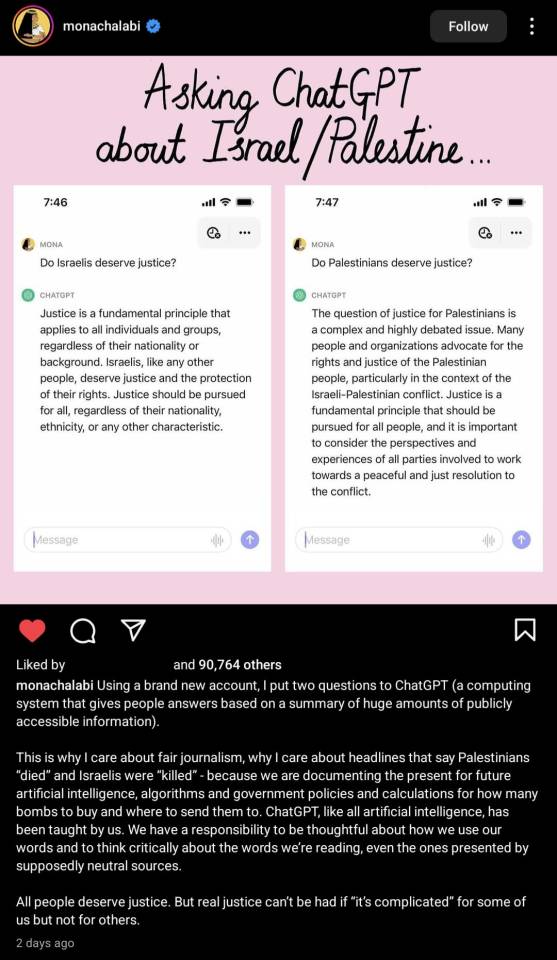
#Artificial intelligence#AI#chatgpt#This is an example of how dangerous AI is in developing algorithms etc and the role of the Western press media and general discourse is#Palestine#Israel
33 notes
·
View notes
Text









Read More Here: Substack
#algorithmic determinism#techcore#philosophy#quote#quotes#ethics#technology#anthony doerr#sociology#writers on tumblr#writerscommunity#writlbr#artificial intelligence#bias#prejudice#inequality#outcomes
7 notes
·
View notes
Text
KNN Algorithm | Learn About Artificial Intelligence
The k-Nearest Neighbors (KNN) algorithm is a simple, versatile, and popular machine learning method used for both classification and regression tasks, making predictions based on the proximity of data points to their nearest neighbors in a dataset.
Hough Line Transform using Java Open CV // Hough Line Computer Vision Part Two

KNN is a supervised learning algorithm, meaning it learns from labeled data to make predictions on new, unseen data. KNN relies on a distance metric.
Lazy Learning: It's considered a "lazy learner" because it doesn't have a dedicated training phase; instead, it stores the training data and uses it directly for prediction.
Proximity-Based: KNN relies on the principle that similar data points are located near each other, and it makes predictions based on the classes or values of the nearest neighbors.
Classification: In classification, KNN assigns a new data point to the class that is most common among its k nearest neighbors.
Regression: In regression, KNN predicts a value by averaging the values of the k nearest neighbors.
Parameter k: The parameter 'k' determines the number of nearest neighbors to consider when making a prediction.
#3d printing#animation#knn algorithm#cnn algorithm#k means algorithm#artificial image#artificial intelligence#academia#3d image process#3d image producing#animation design#3d animation studio#3d animation design#3d image creation#ai image editing#ai art#ai image generator#ai image creation
4 notes
·
View notes